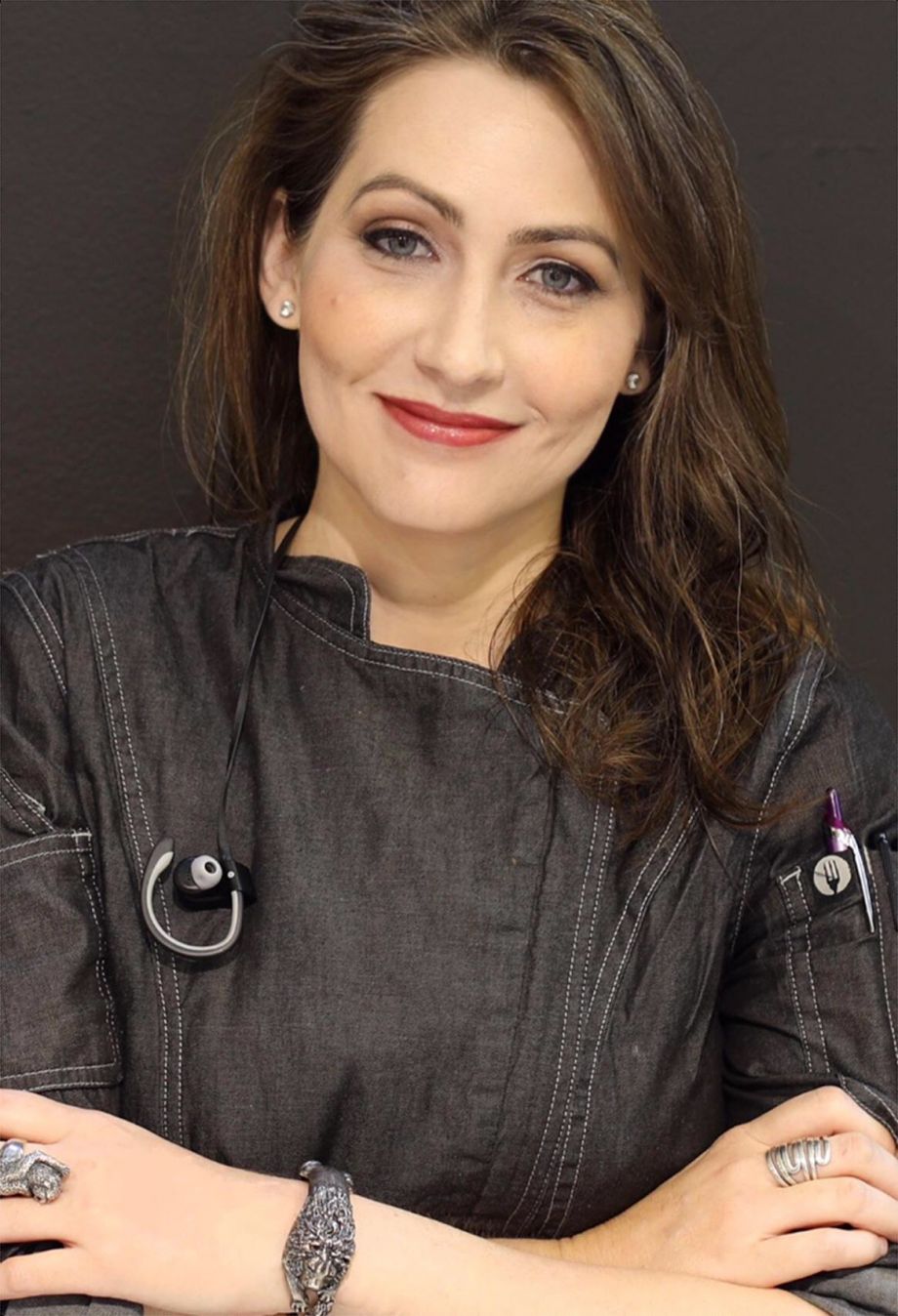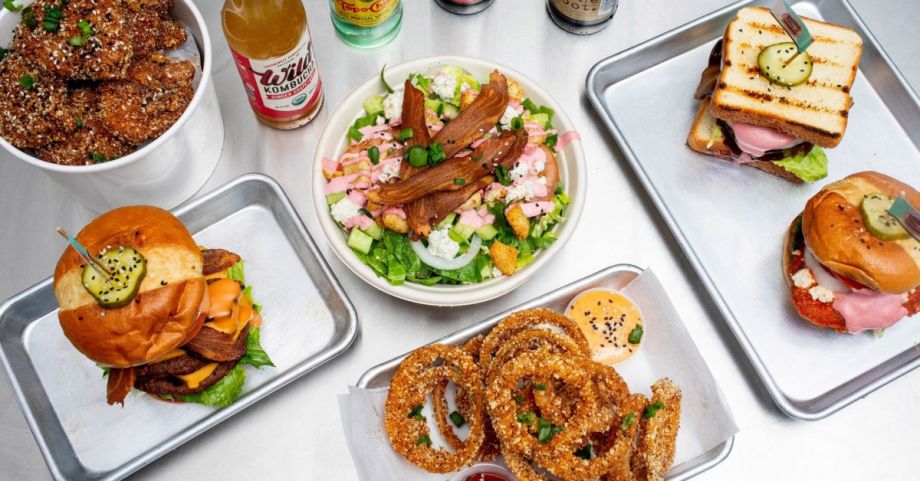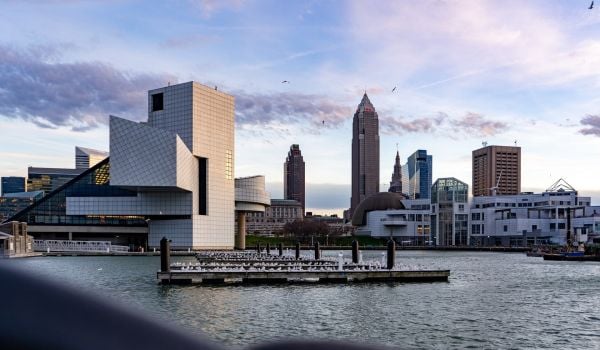Margaux Riccio didn’t become a vegan for any particularly moral or political reasons. Rather, it was a late-in-life discovery of a dairy allergy that caused the Washington, D.C.-based chef and restaurant owner to adopt a plant-based diet. Gradually, Riccio and her partner, Shaun Sharkey, have transformed their restaurant menus as well — first by testing out a Meatless May at their restaurant Pow Pow and later remaking the entire menu with 100% plant-based ingredients. Still, Riccio says, 90% of her customers consider themselves pescatarian. Committed vegans, she says, are “not my biggest fans.”
“I know that people expect me to be the diehard, ‘Save the animals,’ but that’s not my stance with food. I don’t pretend to tell people how to eat,” Riccio says. “Factory farming is fundamentally bad for people and the environment and animals, and if everyone ate just a little less meat we could probably go back to traditional farming where everything and everyone was treated better.”
Last year, during the pandemic, Riccio and Sharkey opened a plant-based food incubator on M Street NW, in D.C.’s downtown business district. The space is intended as both a clearinghouse for Sharkey’s frequent restaurant-concept ideas and a testing ground for other chefs who want to see whether their plant-based dishes will catch on with the dining public, Riccio says. Riccio and Sharkey’s first concept in the space, Bubbie’s Plant Burgers, was positively reviewed in The Washington Post, and has since signed a lease for a permanent location in Adams Morgan, according to a report in the Washington City Paper. The pair is then planning to open a vegan Italian deli called Cenzo’s, and rotate other chefs’ concepts into the space every 6-12 months, Riccio says. The heavily foot-trafficked location is ideal for putting new ideas to the test, she says.
“If you can’t make it there, you can’t make it anywhere,” Riccio says. “Either the concept works or it doesn’t.”

Chef Margaux Riccio (Courtesy Bubbie's Plant Burgers)
Demand for plant-based foods is growing fast in the U.S., with a 27% increase in sales of plant-based products in 2020, according to one report. The plant-food industry expects the global market to grow an additional 11% by 2027. As meat alternatives like Beyond and Impossible burgers grow in popularity, the availability of more plant-based foods is making consumers more comfortable with the products. If that trend helps people consume less meat, it could have major benefits for efforts to reduce the environmental and climate impacts of the food system. Around the world, livestock production alone contributes nearly 15% of global greenhouse gas emissions, according to climate scientists.
Early opponents of the Green New Deal, a set of proposals to fight climate change while building a more equitable economy, zeroed in on the idea that the effort would mean the end of hamburgers. (The original text of the Green New Deal calls for working with farmers to build “a more sustainable food system that ensures universal access to healthy food,” but it does not “ban” beef.) And while fighting climate change demands an overhaul of the global food system, with less production of livestock, scientists say that healthy, climate-conscious diets don’t need to be 100% plant-based.
In 2019, the medical journal The Lancet published “Food in the Anthropocene: the EAT–Lancet Commission on healthy diets from sustainable food systems,” which includes recommendations for global agricultural and dietary changes in the face of health and climate concerns. The report was based on the work of a 19-member commission made of climate scientists, nutritionists, economists and others. It is built around a recommended “healthy reference diet,” which includes consuming lots of whole grains, fruits and vegetables, small amounts of dairy (0-2 servings per day) and minimal red meat.
“Basically some people would call this a flexitarian diet, because it includes modest amounts of animal proteins if people would like that, but it could encompass being a vegan,” says Walter Willett, a professor of epidemiology and nutrition at the Harvard T.H. Chan School of Public Health and chair of the EAT-Lancet Commission.
Currently in the U.S., Willett says, the average diet is poorly aligned with existing USDA dietary guidelines, let alone the recommendations of the global healthy diet in the EAT-Lancet report. And globally, consumption of red meat is on the rise. If current trends stay in place, and the global population increases to about 10 billion by 2050, the food system would produce about double the amount of greenhouse gases that would be sustainable under the Paris climate agreement, Willett says.
“We’ve got to bring fossil fuel emissions down to basically zero to be sustainable, but if we did that and we didn’t change our diets, then we would still miss the Paris climate change agreements,” Willett says. “Basically, the change in our diets is not sufficient, but it’s necessary.”
The commission worked to make its recommended diet adaptable to different cuisines and cultures, Willett says. Still, the diet has come under some criticism about whether it’s easily accessible to most normal people. The U.S. could change existing economic policies that make things like red meat artificially cheap while making fruits and vegetables more expensive than they need to be, Willett says. And while the increasing popularity of plant-based foods has yet to transform the food system, the trend is promising, he says.
“In this country, changes seem to happen mostly from the ground up, not the top down,” Willett says. “We’ve seen that with tobacco and trans fat. It was really individual families and small restaurants—local decisions—that pushed trans fat avoidance, for example and got that implemented locally and then statewide and nationally. Once it started to tip, the big national food services said, ‘We can’t stand the patchwork of requirements.’ Finally after all the trans fat was gone, it got banned nationally.”
In D.C., Riccio says her goals are much more modest and “self-serving.” Rather than having to go through numerous tastings with potential restaurant investors, the incubator will allow investors to try the food alongside the dining public and make decisions about whether they want to help bring a concept to life. Some chefs still look down on plant-based cooking as just “playing with vegetables,” Riccio says. But prior to the pandemic, Riccio and Sharkey had been hosting groups of school kids for classes on plant-based cooking. And Riccio says young people are already much more knowledgeable about and comfortable with plant-based foods than their elders.
“Our next generation is going to be much more interested in plant-based foods than we could ever imagine,” she says. “And they’ll be way more innovative, because they’re not afraid of science and eating plants in a different way.”
EDITOR’S NOTE: This article is part of a Next City miniseries on local Green New Deal initiatives that can be scaled up. This series is generously supported by the Society of Environmental Journalists’ Fund for Environmental Journalism.

Jared Brey is Next City's housing correspondent, based in Philadelphia. He is a former staff writer at Philadelphia magazine and PlanPhilly, and his work has appeared in Columbia Journalism Review, Landscape Architecture Magazine, U.S. News & World Report, Philadelphia Weekly, and other publications.
Follow Jared .(JavaScript must be enabled to view this email address)



_600_350_80_s_c1.jpg)












